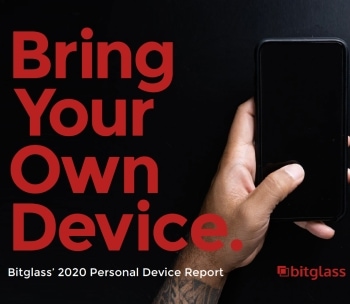
Cloud security provider Bitglass has published its BYOD Report 2020, which analyzes the use and security of personal devices (bring your own device, BYOD) in companies. Bitglass surveyed 303 IT professionals about how companies enable the use of personal devices, what their security concerns are with BYOD, and what measures they have taken to protect their data in a work environment that is increasingly characterized by teleworking and flexibility.
Safety concerns give way to practical advantages
With the rise of teleworking, most companies are also positive about BYOD in the workplace. 69 percent of surveyed companies said that employees are allowed to use their personal devices to get their work done, while some employers also allow contractors, partners, customers, and suppliers to use BYOD. When asked about their biggest BYOD security concerns, 63 percent said they feared data loss and 53 percent said they feared unauthorized data and system access. 52 percent worry about malware infections.
Nevertheless, the use of private end devices is permitted without taking appropriate measures to protect company data. Around half of the companies surveyed lack visibility into file-sharing apps (51 percent), 30 percent have no control or insight into corporate mobile messaging tools, and only 9 percent have cloud-based anti-malware tools. Solutions.
The use of personal devices in the workplace is growing rapidly, but many organizations have not taken any precautions to strike a balance between productivity and safety. In addition, companies need the device PINs in addition to physical access to secure private end devices. This is acceptable for enterprise-supplied, managed devices, but under BYOD it is an invasion of privacy. “The two main reasons organizations are reluctant to allow the use of personal devices are corporate security and security Employee data, ”said Anurag Kahol, Bitglass CTO. “The reality, however, is that modern work environments require flexibility and remote access, and the use of personal devices lives up to that. Companies therefore need comprehensive cloud security platforms that are designed to protect all interactions between users, devices, apps or websites. "
The full report can be downloaded directly from Bitglass.
About Bitglass
Bitglass is a global provider of a NextGen CASB solution based in Silicon Valley. The company's cloud security solutions offer agentless zero-day, data and threat protection everywhere, for every application and every device. Bitglass is funded by senior investors and was founded in 2013 by a group of industry veterans who have introduced and implemented numerous innovations in the past.
